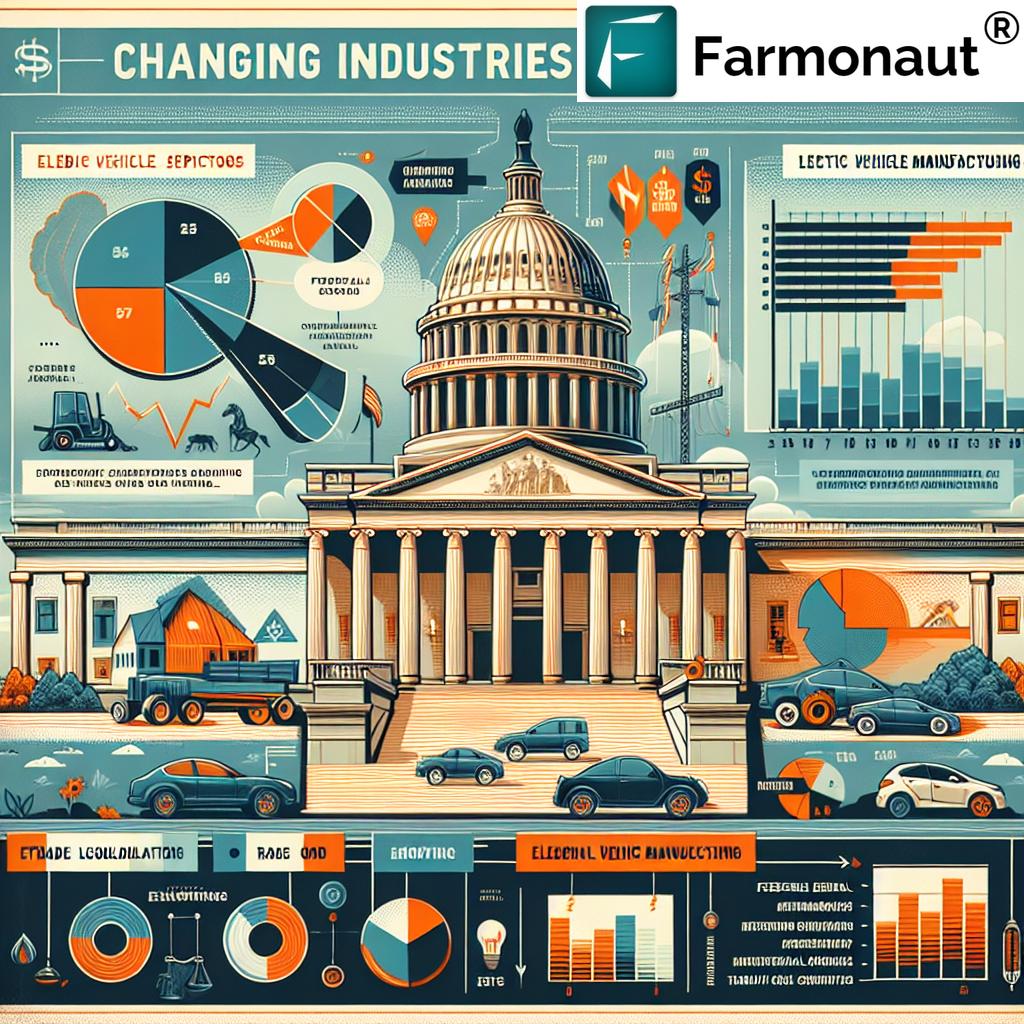Georgia’s Economic Landscape: How Federal Policies Are Reshaping Industries and Workforce
“Georgia’s electric vehicle sector faces significant reshaping due to new federal policies impacting over 10,000 jobs.”
As we delve into the complex tapestry of Georgia’s economic landscape, it’s crucial to understand how recent federal policies are fundamentally reshaping industries and the workforce across the state. The Trump administration’s return to the White House has ushered in a whirlwind of changes that are reverberating through every sector of Georgia’s economy, from agriculture to manufacturing, and from healthcare to international trade.
In this comprehensive analysis, we’ll explore the far-reaching impacts of these federal policies on Georgia’s industries, workforce, and public services. We’ll examine how tariffs, immigration crackdowns, and energy policy shifts are transforming the state’s economic foundations and what this means for businesses, workers, and communities across Georgia.
The Economic Shockwaves of Federal Policy Changes
Within just one month of President Trump’s return to office, his administration has orchestrated a series of sweeping changes that are reshaping the federal government at an unprecedented pace. These changes have significant implications for Georgia’s economy and its diverse industries.
- Widespread federal workforce reductions
- Elimination of entire government agencies
- Legal battles that could redefine presidential powers
- New tariffs on U.S. allies and trading partners
- Potential dismantling of electric vehicle incentives
- Immigration crackdowns and deportation threats
- Rollback of transgender rights and diversity policies
Let’s take a closer look at how these changes are unfolding in Georgia and their potential long-term impacts on the state’s economic landscape.
Trade and Tariffs: A New Era for Georgia’s Global Commerce
The Trump administration’s aggressive stance on international trade has led to a barrage of new tariffs that could fundamentally alter Georgia’s position in the global marketplace. These policy shifts have the potential to reshape domestic manufacturing, impact consumer prices, and force a reevaluation of the state’s trade relationships.
Key trading partners affected by new tariffs include:
- Canada
- China
- Mexico
- European Union
The implications of these tariffs are far-reaching for Georgia’s economy:
- Steel and Aluminum Tariffs: Set to take effect next month, these tariffs will ripple through various industries, potentially leading to price hikes on everything from Coca-Cola cans to construction materials.
- Increased Trade Exposure: Georgia has set records for imports and exports for four consecutive years, making the state more vulnerable to trade disruptions.
- Agricultural Impact: While some view the tariffs as a way to level the playing field for American farmers, others worry about potential retaliatory measures from trading partners.
State Senator Russ Goodman, who leads the Senate Agriculture Committee, sees potential benefits: “I’m all for anything leveling the playing field for American agriculture and American manufacturing. If we’re not going to change the regulatory environment, then the only option we have is tariffs.”
Federal Funding Cuts and Workforce Reductions
The Trump administration’s cost-cutting measures have sent shockwaves through Georgia’s federal workforce and the organizations that rely on federal funding. Executive orders aimed at halting trillions in federal grants and loans have created uncertainty across various sectors.
Key impacts include:
- Potential freezing of billions in federal spending in Georgia
- Uncertainty for agencies and organizations relying on federal funds
- Significant cuts to research funding, including at the National Institutes of Health
- Mass layoffs at federal agencies, including over 1,000 employees at the Atlanta-based CDC
The ripple effects of these cuts extend beyond immediate job losses. There are concerns about long-term impacts on public health, scientific research, and essential services for vulnerable populations.
Immigration and Social Issues: A New Landscape
The Trump administration’s hardline stance on immigration and social issues has found resonance with Georgia’s Republican leadership. Recent developments include:
- The signing of the Laken Riley Act, an immigration crackdown named after a nursing student murdered in Athens
- An executive order banning transgender athletes from competing in women’s school sports
- Increased immigration enforcement activities across the state
- State-level legislative pushes to align with federal immigration and social policies
These policy shifts have sparked intense debate, with supporters arguing for enhanced security and traditional values, while critics warn of economic disruptions and civil rights concerns.
“Federal immigration crackdowns could affect up to 400,000 undocumented workers in Georgia’s agricultural industry.”
Healthcare: The Medicaid Expansion Debate Intensifies
With the return of the Trump administration, Georgia’s healthcare landscape faces significant changes. Governor Brian Kemp has definitively ruled out a full-scale Medicaid expansion, instead pushing for a more limited overhaul that ties coverage to work requirements.
Key points in the healthcare debate:
- Kemp’s proposal to expand Medicaid eligibility to thousands of parents and legal guardians of young children
- Potential scaling back of other parts of the Medicaid program
- Concerns about potential federal budget cuts targeting Medicaid
- Debate over the economic and public health implications of limited healthcare access
Senator Raphael Warnock has voiced concerns about the potential impacts of Medicaid cuts, stating, “We’re making the American workforce sicker and weaker.”
Energy Policy: Uncertainty for Georgia’s Green Energy Hub
The Trump administration’s energy policies have created uncertainty for Georgia’s burgeoning electric vehicle (EV) sector and other clean energy initiatives. Key developments include:
- Freezing of federal funds for various energy projects
- Potential rollback of emissions regulations
- Threats to eliminate EV tax credits
Projects currently in limbo include:
- $1 billion worth of upgrades to Georgia’s electric grid
- EV charging and battery installations in Athens
- Clean energy workforce training in Norcross
While some Republicans support these moves as a way to avoid “picking winners and losers,” industry experts worry about the potential stalling of Georgia’s fast-growing EV sector.
Impact of Federal Policies on Georgia’s Key Industries
| Industry Sector | Current Status | Potential Impact of Federal Policies | Estimated Economic Effect |
|---|---|---|---|
| Agriculture | Strong but facing challenges | Tariffs may help level playing field; immigration crackdowns could affect labor supply | Mixed – Potential growth offset by labor concerns |
| Manufacturing | Growing, especially in automotive sector | Tariffs could increase costs; potential reshoring of production | Moderate Growth |
| Electric Vehicle Production | Rapidly expanding | Potential loss of tax incentives; regulatory changes | Significant Uncertainty |
| Healthcare | Facing challenges with uninsured population | Limited Medicaid expansion; potential federal funding cuts | Moderate Decline |
| International Trade | Record-breaking export/import levels | New tariffs; potential trade wars | Significant Volatility |
The Role of Technology in Adapting to Policy Changes
As Georgia’s industries grapple with these federal policy shifts, many are turning to innovative technologies to enhance efficiency and competitiveness. In the agricultural sector, for instance, satellite-based farm management solutions are helping farmers optimize their operations in the face of changing regulations and market conditions.
Companies like Farmonaut are at the forefront of this technological revolution, offering advanced tools for crop health monitoring, AI-driven advisory systems, and resource management. These solutions can help Georgia’s farmers navigate the challenges posed by new federal policies, from labor shortages due to immigration crackdowns to the need for increased efficiency in the face of potential trade disruptions.
Key technological advancements aiding Georgia’s industries include:
- Satellite-based crop health monitoring
- AI-driven farm advisory systems
- Blockchain-based supply chain traceability
- Advanced fleet and resource management tools
- Carbon footprint tracking for sustainability compliance
These technologies not only help businesses adapt to policy changes but also position Georgia’s industries for long-term competitiveness in the global market.
For those interested in leveraging these technologies, Farmonaut offers several access points:
The Future of Georgia’s Workforce
The reshaping of Georgia’s industries under new federal policies is having a profound impact on the state’s workforce. From potential job losses in the federal sector to new opportunities in emerging industries, the employment landscape is in flux.
- Federal Workforce: Significant reductions, particularly in agencies like the CDC
- Manufacturing: Potential growth as companies respond to tariffs by reshoring production
- Agriculture: Challenges in labor supply due to immigration policies
- Green Energy: Uncertainty in the EV sector could affect job growth
- Healthcare: Potential job impacts from Medicaid policy changes
As the workforce adapts to these changes, there’s an increasing need for reskilling and upskilling programs. Georgia’s educational institutions and workforce development agencies are likely to play a crucial role in preparing workers for the evolving job market.
Georgia’s Response to Federal Policy Changes
State officials and industry leaders are actively responding to the rapid changes in federal policy. Their actions will play a crucial role in shaping Georgia’s economic future.
- State Government Response: Governor Kemp and other state leaders are aligning some policies with federal directives while pushing back on others.
- Industry Adaptation: Businesses are reevaluating supply chains, exploring new markets, and investing in technology to remain competitive.
- Legislative Actions: The Georgia General Assembly is considering bills to address immigration, healthcare, and energy policy in light of federal changes.
- Economic Development Initiatives: State agencies are working to attract new industries and support existing ones through this period of change.
As Georgia navigates these changes, the state’s ability to adapt and innovate will be key to its economic resilience and future growth.
Challenges and Opportunities Ahead
While the reshaping of federal policies presents significant challenges for Georgia’s economy, it also opens up new opportunities for innovation and growth. Here are some key areas to watch:
- Trade Realignment: As global trade relationships shift, Georgia’s ports and logistics sector could find new opportunities.
- Manufacturing Renaissance: Tariffs and reshoring initiatives could boost Georgia’s manufacturing sector.
- Agricultural Innovation: Farmers may turn to advanced technologies like those offered by Farmonaut to overcome labor challenges and improve efficiency.
- Healthcare Reform: The debate over Medicaid expansion could lead to innovative healthcare delivery models.
- Energy Sector Evolution: Despite uncertainties, Georgia’s commitment to clean energy could position it as a leader in new energy technologies.
The key to success will be Georgia’s ability to adapt quickly to these changes, leveraging its strengths and embracing innovation across all sectors.
Conclusion: Navigating Georgia’s Changing Economic Landscape
As we’ve explored in this comprehensive analysis, the impact of federal policy changes on Georgia’s economic landscape is profound and far-reaching. From trade and immigration to healthcare and energy, every sector of the state’s economy is experiencing significant shifts.
While these changes present challenges, they also offer opportunities for innovation and growth. Georgia’s ability to adapt to these new realities will be crucial in determining its economic future. By embracing technological advancements, fostering workforce development, and maintaining a flexible approach to economic policy, Georgia can position itself for success in this new landscape.
As the state continues to navigate these changes, it will be essential for policymakers, business leaders, and citizens to stay informed and engaged in the ongoing dialogue about Georgia’s economic future. The decisions made today will shape the state’s prosperity for years to come.
FAQ Section
Q: How are federal tariffs affecting Georgia’s economy?
A: Federal tariffs are having mixed effects on Georgia’s economy. While they may help level the playing field for some industries, they also increase costs for manufacturers and potentially impact consumer prices. The state’s significant import/export activity makes it particularly sensitive to trade policy changes.
Q: What impact are immigration policies having on Georgia’s workforce?
A: New immigration policies and crackdowns are creating challenges for industries that rely heavily on immigrant labor, particularly agriculture. This could lead to labor shortages and increased costs for these sectors.
Q: How is Georgia’s electric vehicle industry being affected by federal policy changes?
A: Georgia’s growing electric vehicle industry faces uncertainty due to potential rollbacks of emissions regulations and threats to eliminate EV tax credits. This could slow the sector’s growth and impact related jobs and investments.
Q: What is the state’s stance on Medicaid expansion under the new federal administration?
A: Governor Kemp has ruled out full-scale Medicaid expansion but is pushing for a more limited overhaul that ties coverage to work requirements. This approach could impact healthcare access and the overall health of Georgia’s workforce.
Q: How are Georgia’s businesses adapting to these federal policy changes?
A: Many businesses are reevaluating their supply chains, exploring new markets, and investing in technology to remain competitive. Some are turning to advanced solutions like those offered by Farmonaut to optimize their operations and navigate regulatory changes.
Earn With Farmonaut: Affiliate Program
Earn 20% recurring commission with Farmonaut’s affiliate program by sharing your promo code and helping farmers save 10%. Onboard 10 Elite farmers monthly to earn a minimum of $148,000 annually—start now and grow your income!






















